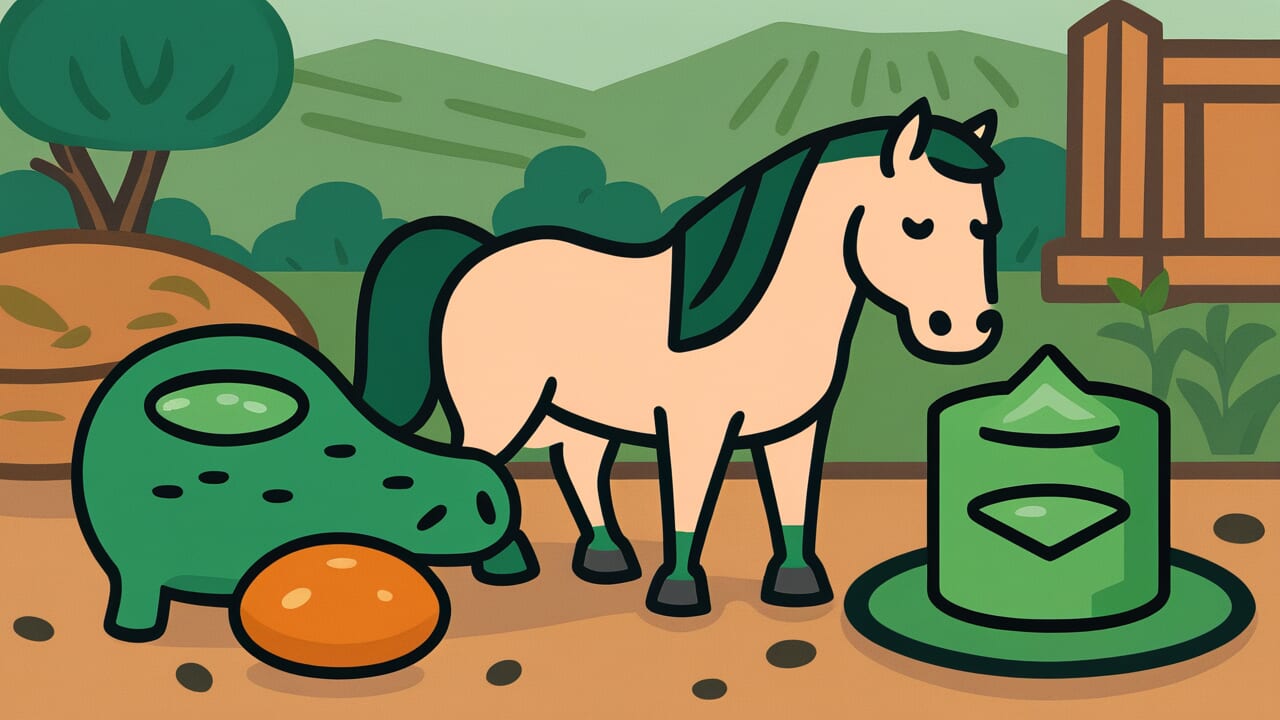How to Read “A jade eats as much as a horse”
A jade eats as much as a horse
[A JAYD eets az much az uh HAWRS]
The word “jade” here refers to an old, worn-out horse, not the green stone.
Meaning of “A jade eats as much as a horse”
Simply put, this proverb means that useless things or people consume just as many resources as valuable ones.
The literal words compare two horses. A jade is an old, tired horse that can barely work. A healthy horse can pull carts and carry riders. Both animals eat the same amount of food each day. The worn-out horse gives nothing back for all that expensive feed.
This saying applies to many situations today. Someone might keep an employee who does little work but still gets paid. A broken car might cost as much to maintain as a working one. Old equipment might use just as much electricity as new machines. The message is clear: things that don’t produce value still consume resources.
People often realize this wisdom applies to their own choices. They might spend time on activities that give nothing back. They could invest energy in relationships that drain them. The proverb reminds us that consumption without contribution creates problems. It makes us think about what we’re getting for what we’re giving.
Origin and Etymology
The exact origin of this proverb is unknown, though it appears to come from rural communities where horses were essential for work and transportation.
During agricultural times, horses represented major investments for families and farms. Feed costs remained high whether a horse could work hard or barely move. Farmers had to make difficult decisions about keeping aging animals. These communities developed sayings about the balance between cost and usefulness. Such wisdom helped people make practical choices about their limited resources.
The saying spread through farming communities and eventually moved into general use. Over time, people began applying it beyond horses to any situation involving wasted resources. The core message remained the same even as society changed. Today we use it for modern situations that our ancestors never imagined.
Interesting Facts
The word “jade” in this context comes from an old term for a worn-out horse, completely unrelated to the precious green stone. This meaning of jade dates back several centuries in English. The proverb uses a simple comparison structure that makes it easy to remember and repeat.
Usage Examples
- Stable owner to potential buyer: “She’s beautiful but expensive to maintain – a jade eats as much as a horse.”
- Mechanic to car owner: “Your luxury sedan will need premium fuel and costly repairs – a jade eats as much as a horse.”
Universal Wisdom
This proverb reveals a fundamental tension in human nature between loyalty and practicality. We naturally form attachments to people, things, and habits that once served us well. Yet circumstances change, and what once provided value may become a burden. The wisdom recognizes that emotional attachment doesn’t reduce real costs.
The saying touches on our difficulty with letting go. Humans evolved in small groups where abandoning anyone or anything felt dangerous. Keeping the old horse meant keeping options open, even expensive ones. This instinct served our ancestors when resources were unpredictable. But it also created situations where sentiment overruled practical judgment. The proverb emerged from countless experiences of communities learning this balance.
At its core, this wisdom addresses the hidden costs of avoiding difficult decisions. Every resource spent on something unproductive is a resource unavailable for something valuable. This creates a double loss that compounds over time. The proverb doesn’t advocate cruelty, but it does demand honesty about real costs. It suggests that true kindness sometimes requires making hard choices rather than avoiding them indefinitely.
When AI Hears This
Humans make a strange math error when keeping useless things around. We count what the jade costs us each day. But we never count what the horse could have earned us. Our brains see the hay going out but miss the work not coming in. This creates a hidden debt that grows bigger over time.
This happens because humans think in straight lines, not curves. We feel the small daily pain of feeding the jade. But we can’t feel the big future loss of missing opportunities. Our minds treat keeping something as free since we already have it. Trading feels expensive because change requires effort and risk.
What fascinates me is that this flaw might actually protect humans sometimes. Loyalty to useless things builds your reputation for keeping promises. Other people trust you more when you stick with commitments. The jade might cost like a horse, but the trust you gain could be worth even more than both.
Lessons for Today
Living with this wisdom requires developing the ability to separate emotional attachment from practical assessment. The challenge lies not in understanding the principle, but in applying it when personal feelings are involved. Most people can easily see waste in other people’s situations while remaining blind to their own resource drains.
The key insight involves regular evaluation of commitments and investments. This doesn’t mean becoming heartless or calculating about everything. Instead, it means honestly assessing what returns we’re getting from our major expenditures of time, money, and energy. Sometimes the return is purely emotional, which has real value. But sometimes we continue patterns simply because we started them, not because they still serve us.
In relationships and communities, this wisdom suggests the importance of honest conversations about contribution and consumption. Groups thrive when members both give and receive value. When the balance becomes too uneven, resentment builds and resources become strained. The proverb reminds us that good intentions don’t eliminate real costs. Recognizing this pattern early allows for adjustments before situations become desperate. The goal isn’t perfection, but awareness of the true price of our choices.



Comments